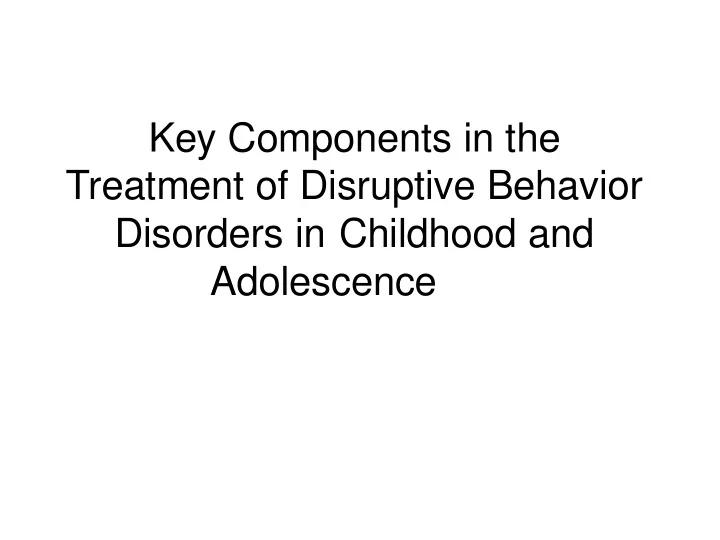

Key Components in the Treatment of Disruptive Behavior Disorders in Childhood and Adolescence Marcia Kearns, M.Ed.,M.A.
Disruptive Behavior Disorders Specific Types Characteristics • Oppositional Defiant • Non-compliance Disorder • Anti-social Behavior • Conduct Disorder • Aggression • Disruptive Behavior • Externalizing Problems Disorder NOS • ADHD
Externalizing Problems • At least 30-50% of child clinic referrals in the U.S. are for conduct problems – Disobedience, breaking rules, argumentativeness – Fighting, bullying, cruelty to other, aggression – Lying, stealing, conning
Associated Outcomes • School failure and drop out • Substance use and abuse • Criminal activity • Early and inadequate parenting • Unemployment
Evidence-Based Practice • Integration of best research evidence, clinical expertise, and patient values (Institute of Medicine, 2001)
Evidence-Supported Treatments • Treatments studied scientifically – Shown to be more beneficial than (no treatment, placebo, or an alternative treatment) across multiple studies
Evidence Supported Interventions for Disruptive Behaviors • Behavioral Parent Training • Youth CBT/Skills Training • Multi-component therapies
Evidence Supported Interventions for Disruptive • Behavioral Parent Training • OSLC’s Parent Management Training • Webster-Stratton’s Incredible Years • Eyberg’s Parent-Child Interaction Therapy • Forehand’s Helping the Noncompliant Child • Sanders’ Positive Parenting Program (Triple P)
• Youth CBT/Skills Training Evidence Supported Interventions for Disruptive • Kazdin’s Interpersonal Problem Solving Skills Training • Lochman’s Anger Coping / Coping Power • Feindler’s Anger Control with Stress Inoculation
Evidence Supported Interventions for Disruptive Behaviors • Multi-component therapies – BPT + CBT – Alexander and Parson’s Behavioral Family Therapy (aka FFT) – Multisystemic Therapy (MST) – Multidimensional Treatment Foster Care (MDTF)
Evidence Base for Youth Treatment •Cognitive Behavioral or Behaviorally Based Interventions –Most consistently found to be efficacious with children with Disruptive Behavior (Hawley & Jensen-Doss, 2007; Weisz et al., 2005)
Barriers to Implementation of Manualized Treatments
Identifying Key Components of Disruptive Behavior Problem Interventions (1) Coded all evidence-based treatment manuals, for components that developers presented as central/critical/core to that treatment (2) Retained those components that showed up repeatedly across treatment manuals (3) Obtained expert validation from treatment developers and researchers via a survey Hawley, KM (2011-2015), Increasing the Capacity of Providers to Monitor Fidelity to Child and Family CBT, National Institute of Mental Health (R21 MH090460; PI: Kristin Hawley, Ph.D.).
Results • Key Tasks for All Phases of Treatment • Key Tasks for the Early, or Beginning, Phase of Treatment • Key Tasks for the Middle, or Working, Phase of Treatment • Key Task for the Ending, or Termination, Phase of Treatment
Key Tasks for All Phases of Treatment – Clear Session Agenda: Discussing a session agenda at the beginning of every session – Ongoing Assessment: Assessing the child’s symptoms and functioning level throughout treatment (often by using some sort of checklist)
Key Tasks for All Phases of Treatment – Continued- – Therapy Homework: Assigning and reviewing out-of-session practice of new skills – In-Session Practice: Using role-plays, or otherwise practicing new skills together, during the appointment – Reinforcement: Praising or rewarding the child for working hard or trying new skills (and often asking the parent to provide reinforcement, as well)
Key Tasks for Early Phase of Treatment – Alliance: Build a strong rapport or working alliance with the child and the parent(s) – Treatment Description and Rationale: Provide child and parent(s) with treatment description (e.g., session format, what is expected of them, rationale for how therapy works) – Treatment Goals: Discuss treatment goals and reach an agreement with child and parent(s) on the goals (may need to revisit or change goals during treatment)
Key Tasks for Middle Phase of Treatment – Parent-Child Relationship: Work with the parent and child to improve their communication and relationship (e.g., child directed play, special time, assertive communication training) – Behavioral Parent Training: Teach the parent to effectively manage noncompliance and behavior problems with improved monitoring of their child’s behavior and with the use of behavior management skills
Key Tasks for Middle Phase of Treatment - Continued- – Feelings Identification: Help the child recognize when they are feeling angry or upset (e.g., thoughts, feelings, physical signs) and rate their level of anger (e.g., SUDS or feelings thermometer) – Cognitive Coping: Work with child to identify and challenge their anger provoking thoughts (e.g., cognitive restructuring, positive self-talk, thought stopping, distraction) – Problem Solving Skills: Teach the child problem solving skills (e.g., coming up with possible solutions, considering likely consequences of each solution, and choosing a solution to try)
Key Tasks for Termination Phase of Treatment – Future Planning: Planning and preparing for future stressors and possible setbacks
Key Component of EST’s for Disruptive Behavior Disorders ***BEHAVIORAL PARENT TRAINING • Seems critical for the ultimate success of Treatment for Disruptive Behavior or Conduct Problems
Summary of Key Components – *Behavioral Parent – Clear Session Agenda Training – Ongoing Assessment – Feelings Identification – Therapy Homework – Cognitive Coping – In-Session Practice – Problem Solving – Reinforcement Skills – Alliance – Future Planning – Treatment Description and Rationale – Treatment Goals – Improve Parent-Child Relationship
Behavioral Parent Training • A set of procedures taught to parents by a therapist aimed at: – Increasing a child’s prosocial behaviors – Reducing deviant and antisocial behaviors
Behavioral Parent Training Techniques • Providing effective commands • Ignoring misbehavior • Natural or logical consequences • Time out • Positive reinforcement
Summary and Conclusions • Behavioral Parent Training is emphasized across evidence based interventions for disruptive behavior problems • Treatment researchers and treatment developers have identified it as the key ingredient to effective treatment for disruptive behaviors • Its importance relative to other treatment components, however, remains an empirical question. • For the time being, it is thought to be the most important component.
Recommend
More recommend